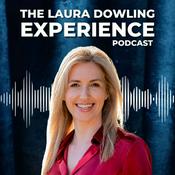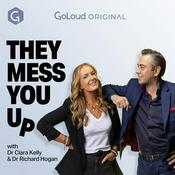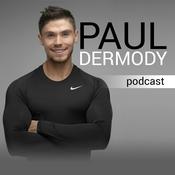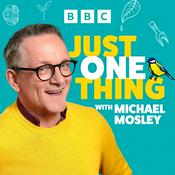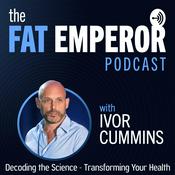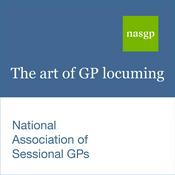707 episodes
Episode 372: Why Success Isn’t Enough: Becoming Trigger-Proof and Healing the Fawn Response with Dr. Nima Rahmani
16/2/2026 | 49 mins.In this episode of The Addicted Mind, Duane speaks with Dr. Nima Rahmani, a former chiropractor turned emotional health educator. Dr. Nima shares his profound journey from "success on paper" to a total relational breakdown that forced him to confront his own deep-seated patterns of anxious attachment and fawning.
They dive deep into the concept of becoming "trigger-proof," the hidden cost of people-pleasing, and why "shame alchemization" is the secret to a truly authentic life. Whether you are struggling with addiction, burnout, or toxic relationship cycles, this episode offers a roadmap for moving from unconscious reactivity to conscious leadership.
Key Topics & Chapters
[01:32] The Wake-Up Call: Dr. Nima discusses how a crisis in his personal life and a brush with the legal system forced him to look past his professional success and address his defensive reactivity.
[03:54] The Cost of Fawning: A breakdown of the "Fawn" response—how suppressing your truth to appease others creates a "bottomless pit" of resentment and physical inflammation.
[10:14] Defining the Fawn Response: Dr. Nima provides a powerful analogy of how children learn to appease "predators" (caregivers) to survive, and how that evolves into a destructive adult relationship strategy.
[14:41] Somatic Impact: Exploring the link between unresolved emotional wounds, fawning, and chronic physical issues like autoimmune diseases and inflammation.
[21:00] Loving the Shadow: Why true self-love isn't about liking your "best" parts, but about "unshaming" the parts of yourself you’ve tried to kill off or hide.
[27:12] Success vs. Intimacy: Why high-achieving entrepreneurs often crush it in business but fail in relationships, and how the "push energy" of success can actually block emotional safety.
[47:26] The Worthiness Inquiry: Dr. Nima shares a foundational question for listeners: "I am only worthy of love when..."
[52:00] The Heartbeat Realization: A moving story about hearing his son’s heartbeat and rediscovering the concept of inherent worthiness.
Key Quotes
"Shame alchemization is the secret to being a human... finding these embarrassing, unacceptable parts of us and really looking to understand them." — Dr. Nima Rahmani
"Fawning is when you freeze a part of you in an interaction... you freeze your truth and then you perform niceness." — Dr. Nima Rahmani
"One size fits all is not real. It’s not real for baseball caps, and it’s not real for recovery plans." — Dr. Nima Rahmani (Note: This is a callback to the theme of individualized healing)
"The path to self-love is really about loving your shadow." — Dr. Nima Rahmani
Understanding the Survival Responses
To better understand where "Fawning" fits into our biological safety system, it helps to see it alongside the more commonly known stress responses:
Fight: Aggression and boundary-setting.
Flight: Avoiding or escaping the threat.
Freeze: Numbing out or becoming paralyzed.
Fawn: Appeasing the threat to ensure safety.
Resources Mentioned
The Attachment Style Quiz: Discover if you are anxious, avoidant, or disorganized. [Link provided in bio/show notes]
Recovery Demystified: Exploring "Quit Lit" and science-based recovery tools.
"Unshaming": The work of David Bedrick.
About Dr. Nima Rahmani
Dr. Nima Rahmani is the founder of the Trigger-Proof methodology. He helps entrepreneurs and individuals heal attachment wounds to uplevel their capacity for love and leadership.
Connect with Dr. Nima:
Website:https://becometriggerproof.com/
Instagram: @nimarahmanyofficial
Previous Interview With Dr. Nima Rahmani
If you live in California and are looking for counseling or therapy please check out Novus Mindful Life Counseling and Recovery Center
NovusMindfulLife.com
We want to hear from you. Leave us a message or ask us a question: https://www.speakpipe.com/addictedmind
Disclaimer
See Privacy Policy at https://art19.com/privacy and California Privacy Notice at https://art19.com/privacy#do-not-sell-my-info.- Download: Debunking Common Emotion Myths Worksheet
Have you ever felt like your emotions are running the show, pushing and pulling you in directions you don’t want to go? You’re not alone.
In this episode of the Addicted Mind Plus, hosts Duane Osterlind and Eric Osterlind dive deep into the world of emotion regulation. They explore common myths about emotions that keep many of us stuck in unhealthy patterns. With practical insights and compassionate guidance, Duane and Eric shed light on how our misunderstandings about emotions can lead to more intense feelings and problematic behaviors.
By debunking these myths, they show us how to develop healthier relationships with our emotions, allowing us to make decisions that align with our true goals. Whether you’re struggling with impulsive reactions or avoidance strategies or just want to understand your emotions better, this episode is packed with valuable information that can help you navigate your emotional landscape more effectively.
Join Duane and Eric as they explore the myths surrounding emotion regulation and how these misconceptions can hinder our recovery journey. Learn about the importance of understanding your emotions from a biopsychosocial perspective and discover practical tips to regulate your emotions instead of letting them control you. By the end of this episode, you’ll have a better grasp of how to manage your emotions and make decisions that support your well-being.
Key Topics
Understanding the impact of emotions on decision-making
The importance of emotion regulation skills in recovery
Debunking common myths about emotions
The role of avoidance and escape strategies in emotional intensity
How to develop a healthier relationship with your emotions
The benefits of Dialectical Behavioral Therapy (DBT) in emotion regulation
Practical steps to regulate emotions effectively
Key Moments
[00:01:22] - Introduction to the topic of emotion regulation
[00:02:07] - The problem with letting emotions drive our decisions
[00:03:00] - Defining emotion regulation and its significance
[00:07:19] - Introduction to myths about emotions
[00:09:08] - Discussion on the myth: Emotions are bad or dangerous
[00:11:44] - Exploring the myth: If I start feeling, I’ll never stop
[00:14:00] - Addressing the myth: I should be able to control my emotions
See Privacy Policy at https://art19.com/privacy and California Privacy Notice at https://art19.com/privacy#do-not-sell-my-info. Episode 371: Neurodivergence, Identity, and the Science of Micro-Recovery with Early Brunner
09/2/2026 | 39 mins.In this episode, Duane speaks with Early Brunner, the founder of Recovery Demystified. Early shares their powerful journey of navigating addiction as a queer, neurodivergent (autistic) person growing up in a small town. They discuss why traditional recovery models like AA can feel alienating for marginalized groups and how science-based "Quit Lit," neuroscience, and self-compassion provided the path to lasting sobriety.
Key Topics & Chapters
[00:03] Introduction to Early Brunner Early introduces their background: growing up undiagnosed autistic in 90s Wisconsin, dealing with profound social rejection, and discovering substances at age 10 as a way to find social connection.
[04:30] The 13-Year Struggle Early discusses the "vicious cycle" of trying to quit using willpower alone. They share the shame of failed attempts and the realization that the substances that once provided relief were now the primary source of their crippling anxiety.
[14:05] The Turning Point: Beyond Willpower The shift began when Early found science-based resources like This Naked Mind by Annie Grace. Understanding the neuroscience of addiction helped them realize they weren't "broken" or "powerless," but rather dealing with a brain-based challenge that could be repaired.
[23:34] The Birth of Recovery Demystified After working as an EMT and seeing the failures of the traditional medical system, Early felt called to create a space specifically for those with "complex identities"—queer and neurodivergent folks who face significantly higher rates of addiction due to systemic trauma.
[33:44] Neurodivergence and Addiction A deep dive into why ADHD and Autistic individuals are more prone to substance use, focusing on lower baseline dopamine levels, sensory overload, and the "mashing of the dopamine button" to cope with a world not built for them.
[36:10] Destigmatizing the Story Early explains the importance of looking at the "whole person," including their childhood (ACEs score), rather than just their worst moments in active addiction.
Quotes
"Willpower is like a muscle, and muscles get tired over time... I think you need an ounce of willpower and about 25 pounds of everything else." — Early Brunner
"One size fits all is not real. It’s not real for baseball caps, and it’s not real for recovery plans." — Early Brunner
"The first step was asking: 'What would someone who loves themself do?'" — Early Brunner
Resources Mentioned
Book: This Naked Mind by Annie Grace
Podcast: Recovery Elevator
Concept: ACEs Score (Adverse Childhood Experiences)
Connect with Early Brunner
Website: recoverydemystified.com
Podcast: Recovery Demystified
Social Media: @recoverydemystified (Instagram/Substack)
Email: [email protected]
NovusMindfulLife.com
Episode Credits
If you like this podcast and are thinking of creating your own, consider talking to my producer, Emerald City Productions. They helped me grow and produce the podcast you are listening to right now. Find out more at https://emeraldcitypro.com Let them know we sent you.
See Privacy Policy at https://art19.com/privacy and California Privacy Notice at https://art19.com/privacy#do-not-sell-my-info.370 Episode: Exposing the "Florida Shuffle": How Greed Corrupted the Treatment Industry with Benjamin Flaherty
02/2/2026 | 42 mins.In this powerful episode, Duane sits down with filmmaker Benjamin Flaherty to discuss his hard-hitting documentary, Shuffle. The film pulls back the curtain on the "Florida Shuffle"—a predatory cycle in the billion-dollar addiction treatment industry where vulnerable individuals are "brokered" between facilities for insurance payouts.
Benjamin shares his own journey of recovery and explains how his personal experience allowed him to gain unprecedented access to a community often silenced or exploited. This conversation explores the dark intersection of greed and healthcare, the resilience of the human spirit, and why the current treatment system desperately needs transparency.
Key Discussion Points
Benjamin’s Recovery Journey: How a moment of clarity at age 41 led Benjamin from "professional alcoholism" to a transformative experience in treatment.
The Origins of Shuffle: A chance conversation in an AA meeting revealed a disturbing trend: recovery call centers becoming a primary source of employment for those in early sobriety.
What is the "Florida Shuffle"? Benjamin explains how the Affordable Care Act (ACA) unintentionally created a loophole where "patient brokers" poach insured individuals, profiting from their relapses.
The Statistic that Shocks: There are currently more private substance abuse treatment centers in the U.S. than there are McDonald's restaurants.
Witnessing the Cycle: The emotional weight of filming Corey and Nicole—two individuals caught in the cycle of being "bought and sold" by treatment facilities.
The "Driveway Recordings": Why Benjamin chose to use raw, iPhone voice memos for the film's narration to maintain emotional authenticity.
Maintaining Hope: Despite the systemic corruption, the film highlights the incredible resilience of those in recovery and the fact that healing is still possible.
Notable Quotes
"Stopping a substance is the entry card for admission. That’s not the whole thing. There’s a lot of work to do, and none of us know that until we find it out in our own way." — Benjamin Flaherty
"We’ve now made relapse profitable. We’ve incentivized the struggle by providing substandard care because an insurance card is like a blank check." — Benjamin Flaherty
"I approached my time with Corey not as a filmmaker first, but as a person in recovery. I had to witness it to make it impossible to ignore." — Benjamin Flaherty
Resources Mentioned
The Documentary: Shuffle (also referred to as Stop the Shuffle)
Website: stoptheshuffle.com — Find theater locations, tickets, and upcoming streaming info.
Social Media: Follow the movement on Instagram @StopTheShuffle.
Episode Credits
If you like this podcast and are thinking of creating your own, consider talking to my producer, Emerald City Productions. They helped me grow and produce the podcast you are listening to right now. Find out more at https://emeraldcitypro.com Let them know we sent you.
See Privacy Policy at https://art19.com/privacy and California Privacy Notice at https://art19.com/privacy#do-not-sell-my-info.- Download: OVERCOMING BLACK OR WHITE THINKING WORKSHEET
Welcome to the Addicted Mind podcast! Have you ever caught yourself thinking, "I'm either a success or a complete failure"? This episode is for you.
In this episode, we dive deep into the pervasive issue of black-and-white thinking, also known as dichotomous thinking and its impact on addiction recovery. Join Duane Osterlind and Eric Osterlind as they explore how this rigid mindset can create emotional instability and hinder progress. Drawing on principles from Dialectical Behavior Therapy (DBT), they discuss practical steps to move from extreme thinking to a more balanced, nuanced approach. You'll learn mindfulness techniques, how to challenge your thoughts, and the importance of embracing the gray areas in life. By the end of this episode, you'll have valuable tools to help you think more dialectically and support your journey to recovery. Plus, don't miss the downloadable worksheet in the show notes to further your practice!
Key Topics
Understanding black-and-white thinking and its impact on recovery
Introduction to Dialectical Behavior Therapy (DBT)
Practical steps to shift towards dialectical thinking
Importance of mindfulness and self-compassion
Challenging extreme thoughts and seeking clarification
The role of language in shaping our perceptions
Timestamps
[00:00:00] Introduction and overview of black-and-white thinking
[00:02:15] The impact of black-and-white thinking on recovery and relationships
[00:06:15] Why our brains default to black-and-white thinking
[00:08:40] How to become a gray thinker: Practical steps
[00:10:58] Seeking clarification and the role of community support
[00:12:42] Reframing negative thoughts and focusing on positives
[00:14:11] Call to action: Download the worksheet and join the community
See Privacy Policy at https://art19.com/privacy and California Privacy Notice at https://art19.com/privacy#do-not-sell-my-info.
More Health & Wellness podcasts
Trending Health & Wellness podcasts
About The Addicted Mind Podcast
"The Addicted Mind Podcast" offers hope, understanding, and guidance for those dealing with addiction, with real stories and research to inspire and show the journey to recovery is worth it.We're here to do more than just talk about addiction. We want to show you how to heal and recover.Our talks with experts and people who have beaten addiction give you important insights into how addiction affects the mind and how recovery can happen in many ways. Whether we're looking at new treatment ideas or sharing stories that inspire, "The Addicted Mind Podcast" is all about understanding the complex world of addiction recovery and showing that recovery is possible.If you or someone you care about is dealing with the challenges of addiction, let "The Addicted Mind Podcast" be your friend and guide. We aim to give you the knowledge you need, share stories that inspire you, and show you that the journey to recovery is worth it.Subscribe now to be part of a community focused on learning, healing, and changing for the better. Your journey to a healthier mind and life begins right here.
Podcast websiteListen to The Addicted Mind Podcast, ZOE Science & Nutrition and many other podcasts from around the world with the radio.net app

Get the free radio.net app
- Stations and podcasts to bookmark
- Stream via Wi-Fi or Bluetooth
- Supports Carplay & Android Auto
- Many other app features
Get the free radio.net app
- Stations and podcasts to bookmark
- Stream via Wi-Fi or Bluetooth
- Supports Carplay & Android Auto
- Many other app features


The Addicted Mind Podcast
Scan code,
download the app,
start listening.
download the app,
start listening.




